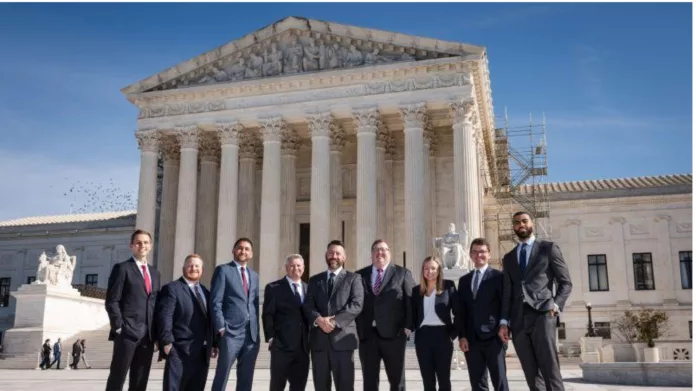By Robert A. Emmanuel
Being called to the bar in the United States of America could be described as a moment of surreal joy for young lawyers who are aiming to reach the top of their profession.
However, for a 28-year-old Antiguan, William ‘Trey’ Smith III, that moment of joy was swiftly surpassed in just over a year when he got the opportunity to assist a team of pro bono (volunteer) lawyers on a case involving American veterans’ benefits, which was argued before the US Supreme Court last week.
Smith expressed that the moment was “surreal” and “humbling” to have sat before the justices and hear their deliberations on the arguments presented.
“I don’t care about rankings or anything of that sort, I think it is a big deal, a once in a career opportunity to participate in that sort of case and I am personally grateful to work with the people that I did,” he explained.
According to Smith, he is unbothered about whether he was one of the first Antiguans to argue before the Supreme Court, stating that the experience of preparing for a Supreme Court case was a unique opportunity.
Smith, who hails from Cedar Valley, attended St Andrew’s Primary School, St Joseph’s Academy, and Island Academy before studying in the US at the University of Virginia and completing his bachelor’s degree in political science in 2018.
He now practices regulatory law at the law firm, Troutman Pepper, but said that he did not expect to be involved in a case to be heard before the Supreme Court; it was a matter of simply helping out his mentor, Tim McHugh, a former Army paratrooper and attorney.
“It wasn’t before the Supreme Court yet. It was before the Court of Appeals for the Federal Circuit—basically the last court of appeals before the Supreme Court and, for background, he had argued that case from the Board of Veterans Appeals, one of the lowest appeals processes in the Department of Veterans Affairs.
“And right before the final appellant court, he asked me if I wanted to help him prepare for oral arguments because he was getting ready to appear before them,” he said.
In the coming months, the justices will decide on the merits of legal arguments and announce their decision.
Meanwhile, the young Antiguan goes back to his regular job—regulatory law.
“It’s a cool area of practice because every day is a little different; I do a lot of work for an energy company, just helping to get their infrastructure projects approved by the state, I do a fair amount of litigation at the state level and the lower federal court—typically against government agencies, state attorneys and federal agencies.
“It is seeping into a lot of cutting-edge areas of technology, law and business, and it happens in a way that sometimes there is no clear law on the point,” he explained.
And, as with any legal practice, legal advice on new regulations or statutes form part of the daily agenda, especially as technology such as artificial intelligence and cryptocurrency continues to be discussed by global regulators.
“There might be a new regulation coming out and they want us to advise them on how to handle it, so we give them advice on how to make sure that their products conform with the law which is interesting and fun because you are helping to put the measures in place so that they can have a successful rollout,” he added.
Whether he stays in the regulation practice or ventures into other forays, the 28-year-old lawyer expressed satisfaction in his journey thus far.
“It is not one I really have the answer to; I really enjoy what I do and when I no longer enjoy it or when something changes, then that will be the decision to be made at the time.
“What I do like about my practice area and my firm is that I participate in so many types of matters, it allows me to keep my curiosity satisfied and intellectually stimulated, so it really is taking it day by day,” he said.

